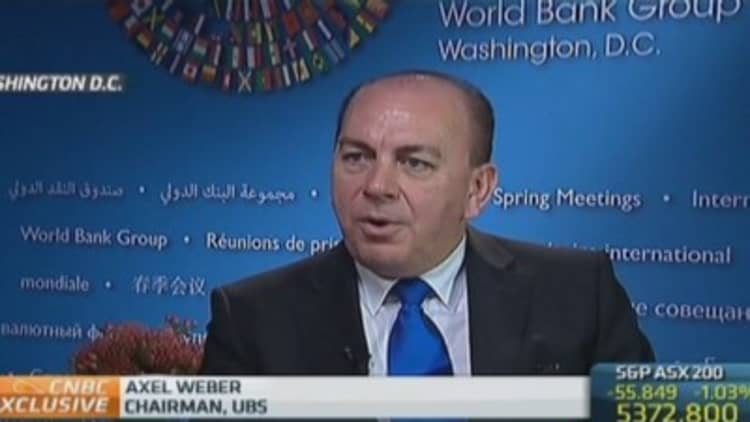
Debt markets think the euro zone debt crisis is over and are "underpricing" the risks, Axel Weber, former head of the Bundesbank, Germany's central bank, has warned.
"Markets, when they re-price, always overshoot. But at the moment, as they're re-pricing to a normal situation, they're also overshooting," Weber, currently chairman of Swiss bank UBS, told CNBC in an interview at an International Monetary Fund meeting in Washington.
Read MoreNo straightforward recovery in Europe: Weber
"The market is probably too benign on some of the developments in Europe. It's pricing as if the problems were behind us, but what is behind us is the bad headlines, and the problems are still there," he warned.
As worries about the euro zone debt crisis receded after European Central Bank president Mario Draghi pledged to do "whatever it takes" to save the euro, there has been a return to normality in the region. Greece, once viewed as a basket case and potentially the first country to leave the 18-country currency group, last week managed to raise money on the bond markets again.
However, growth is still stagnant in Europe and a host of economic and social problems of the crisis, such as high youth unemployment, remain.
Draghi warned of the "financial stability implications" of the euro zone's long period of record low interest rates at the meeting.
"One important factor in our recovery is a return in confidence, but confidence can be easily broken by serious financial stability accidents," he told CNBC.
Read MoreIs voracious appetite for Greek bonds justified?
"The ECB and the central banks have done a big part of the heavy lifting up till now, going forward, the governments need to come in and basically do some of the heavy lifting themselves," Weber said.
One example of the "underpricing", he pointed out, was Spain, which now has to pay less to get its funding from the market than the U.S., despite having much worse unemployment and growth figures than the U.S..
Read MoreHow real is the euro zone recovery?
European banks, including UBS, have had to adopt new regulations as a result of the crisis. UBS has had to increase the amount of capital it holds, after costly involvement in scandals like the Libor price-fixing probe led to more than 2 billion Swiss francs being paid out.
"It'll take some time and we have to do the new regulation, but at the same time it needs to shift at some point again onto investment," Weber told CNBC.

